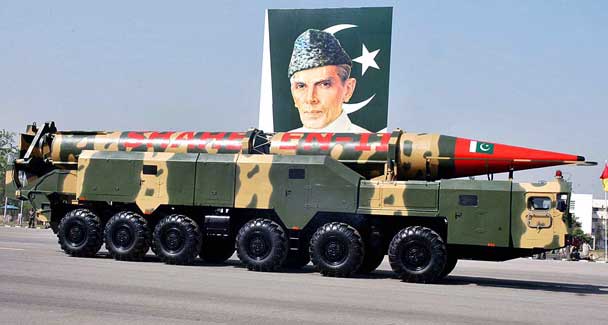www.aljazeerah.info
Opinion Editorials, January 2016
Archives
Mission & Name
Conflict Terminology
Editorials
Gaza Holocaust
Gulf War
Isdood
Islam
News
News Photos
Opinion Editorials
US Foreign Policy (Dr. El-Najjar's Articles)
www.aljazeerah.info
Pakistan Has Around 130 Nuclear Warheads to Deter an Indian Military Attack
By Abdus Sattar Ghazali

Al-Jazeerah, CCUN, January 22, 2016
 |
|
Pakistan's nuclear warheads which are estimated to be between
110-130 are aimed at dissuading India from taking military action against
it, a US Congressional report says.
Pakistan’s nuclear arsenal is
widely regarded as designed to dissuade India from taking military action
against Pakistan, the report said adding: "but Islamabad’s expansion of
its nuclear arsenal, development of new types of nuclear weapons, and
adoption of a doctrine called “full spectrum deterrence” have led some
observers to express concern about an increased risk of nuclear conflict
between Pakistan and India, which also continues to expand its nuclear
arsenal."
The Congressional report titled "Pakistan’s Nuclear Weapons"
was released on January 14. It is written by Nonproliferation experts,
Paul K. Kerr and Mary Beth Nikitin.
Congressional Research Service
(CRS) is the research wing of the US Congress, which prepares periodic
reports by eminent experts on a wide range of issues so as to help
lawmakers take informed decisions.
"Pakistan has in recent years
taken a number of steps to increase international confidence in the
security of its nuclear arsenal," said the CRS report.
Moreover,
Pakistani and US officials argue that, since 2004 Islamabad has taken a
number of steps to improve its nuclear security and to prevent further
proliferation of nuclear-related technologies and materials, it said. A
number of important initiatives, such as strengthened export control laws,
improved personnel security, and international nuclear security
cooperation programs, have improved Pakistan's nuclear security, the CRS
said.
"However, instability in Pakistan has called the extent and
durability of these reforms into question. Some observers fear radical
takeover of the Pakistani government or diversion of material or
technology by personnel within Pakistan's nuclear complex," the CRS said.
"While US and Pakistani officials continue to express confidence in
controls over Pakistan's nuclear weapons, continued instability in the
country could impact these safeguards. Furthermore, continued Indian and
Pakistani nuclear weapons development could jeopardize strategic stability
between the two countries," it concluded.
Chronic political
instability in Pakistan and Islamabad’s military efforts against the
Taliban and al-Qaeda have raised concerns about the security of the
country’s nuclear weapons, the report said and added that "some observers
fear that Pakistan’s strategic nuclear assets could be obtained by
terrorists or used by elements in the Pakistani government. However, U.S.
officials have generally expressed confidence in the security of
Pakistan’s nuclear weapons."
According to the CRS report:
"Islamabad is expanding its nuclear arsenal and developing of new types of
nuclear weapons. Special Representative for Afghanistan and Pakistan
Ambassador Richard Olson told the House Committee on Foreign Affairs on
December 16, 2015, that the United States is “concerned” about “the pace
and the scope of the Pakistan’s missile program, including its pursuit of
nuclear systems.” The administration also worries that “a conventional
conflict in Southwest Asia could escalate to include nuclear use as well
as the increased security challenges that accompany growing stockpiles,”
he added."
The CRS report pointed out that the United Kingdom’s
Foreign and Commonwealth Office has argued that “Pakistan’s strategic
posture, including nuclear, is clearly framed around its perception of the
threat from India.” Similarly, then-DIA Director Burgess told the Senate
Armed Services Committee on March 10, 2011, that the “persistent
India-Pakistan rivalry drives Islamabad to develop its nuclear
infrastructure, expand nuclear weapon stockpiles ... and seek more
advanced nuclear warheads and delivery systems, including cruise
missiles.” Pakistan has repeatedly described its strategic doctrine as
“credible minimum deterrence.” Islamabad has pledged no-first-use against
non- nuclear-weapon states, but has not ruled out first-use against a
nuclear-armed aggressor, such as India.
Abdus Sattar Ghazali is
the Chief Editor of the Journal of America (www.journalofamerica.net)
email: asghazali2011 (@) gmail.com
Share this article with your facebook friends
|
|
|
|
||
|
||||||


